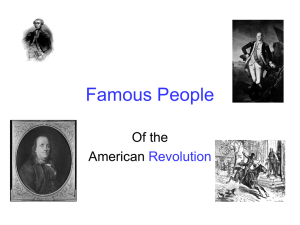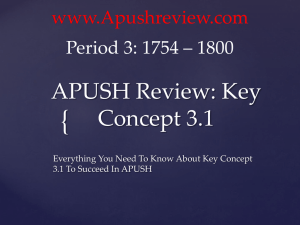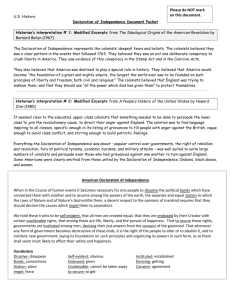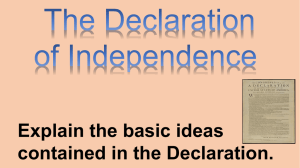Revolutionary War Unit Interactive Notes
advertisement
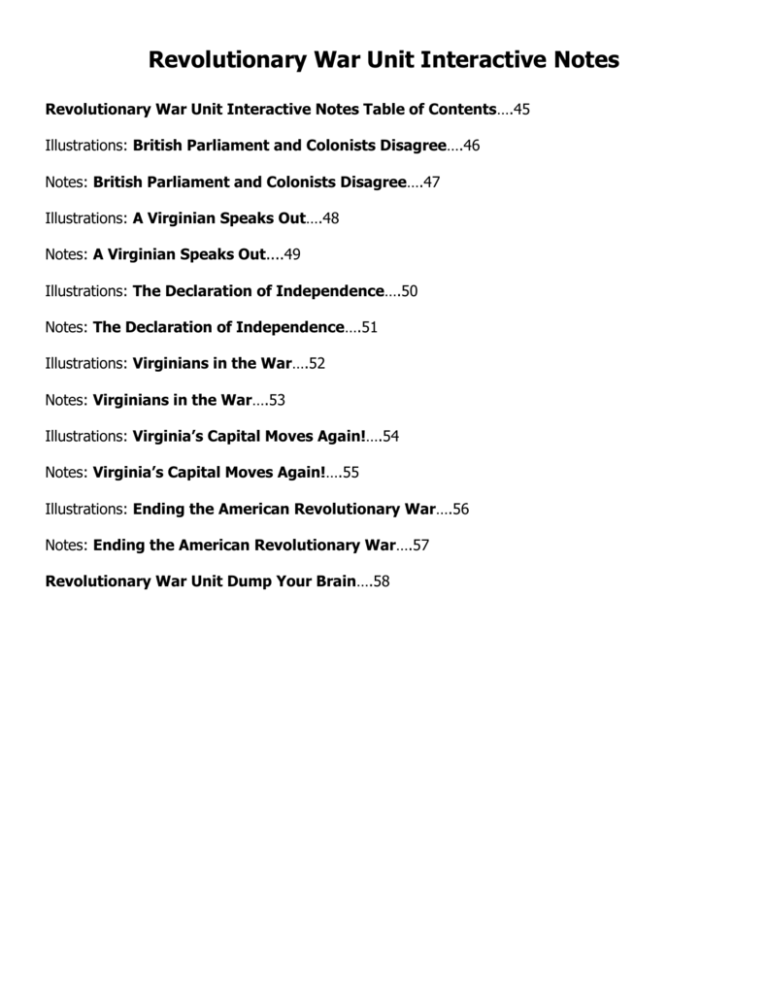
Revolutionary War Unit Interactive Notes Revolutionary War Unit Interactive Notes Table of Contents….45 Illustrations: British Parliament and Colonists Disagree….46 Notes: British Parliament and Colonists Disagree….47 Illustrations: A Virginian Speaks Out….48 Notes: A Virginian Speaks Out....49 Illustrations: The Declaration of Independence….50 Notes: The Declaration of Independence….51 Illustrations: Virginians in the War….52 Notes: Virginians in the War….53 Illustrations: Virginia’s Capital Moves Again!….54 Notes: Virginia’s Capital Moves Again!….55 Illustrations: Ending the American Revolutionary War….56 Notes: Ending the American Revolutionary War….57 Revolutionary War Unit Dump Your Brain….58 British Parliament and Colonists Disagree As a result of the French and Indian War, the British Parliament (Great Britain’s government) was in debt and wanted the colonists to help pay for the war. To pay off this debt, Parliament passed many new laws. One of the most hated of these laws was the Stamp Act, which made the colonists, the British that settled in America, not the British living in Great Britain, pay a tax for newspapers, playing cards, legal documents, calendars, and pamphlets, by placing a special stamp on each of the items that they paid for. This caused conflict between the colonists and the British. They disagreed over how the colonies should be governed or ruled. First, Parliament believed it had legal authority in the colonies, while the colonists believed their local assemblies, or local government, had legal authority. Second, Parliament also believed it had the right to tax the colonies, while the colonists believed they should not be taxed since they had no representation in Parliament. This caused the colonists to become furious with Great Britain. A Virginian Speaks Out The colonists were furious with Parliament because they were not being treated equally like King James I charter had said they would. They cried, “No taxation without representation,” because they did not think they should be taxed if they did not have anyone representing them and speaking for them in Parliament. Patrick Henry, a Virginia House of Burgesses member, did not like the taxing and tried to find a solution for it. He spoke to them about his belief that the colonists would have to go to war in order to gain equal rights from Great Britain. Patrick Henry inspired patriots from other colonies when he spoke out against taxation without representation by saying, “…give me liberty or give me death.” The Declaration of Independence Once fighting began between the colonists and the British, Virginia’s Congress met to talk about independence, the freedom to govern themselves. They decided to ask Thomas Jefferson to write the Declaration of Independence, which would explain why the colonists wanted independence from Great Britain. The Declaration of Independence was an important document written to King George III and British Parliament which stated that the authority, or power, to govern belongs to the people, not to kings, and that all people are created equal and have rights to life, liberty, and the pursuit of happiness. When Thomas Jefferson finished the Declaration of Independence, the Congress adopted it on July 4, 1776. Since it was adopted on the 4th of July, Americans consider this date our country’s birthday. Virginians in the War Many Virginians played an important role, making contributions during the Revolutionary War. Some were patriots who served in the Continental Army and fought for independence against the British, while others were loyalists who remained loyal to Great Britain. There were even some Virginians that were neutral and did not to take sides. Women helped during the war by taking on more responsibilities to support the war effort. African Americans in Virginia were divided about the war. Some enslaved African Americans fought for a better chance of freedom. Some free African Americans fought for independence in the American Revolution. Many American Indians fought alongside both the Virginia patriots and the British. George Washington provided military leadership by serving as commander-in-chief of the Continental Army. Thomas Jefferson provided political leadership by expressing the reasons for colonial independence from Great Britain when he wrote the Declaration of Independence. James Lafayette, an enslaved African American from Virginia, served in the Continental Army and successfully requested his freedom after the war. Virginia’s Capital Moves Again! During the American Revolution, the capital of Virginia left Williamsburg. Richmond was made Virginia’s new capital for several reasons. First, the population of Virginia was moving westward. Second, Richmond was a more central location. Third, moving to Richmond increased the distance from attack by the British. Ending the American Revolutionary War After many years of fighting, the colonists won the war because of important events that occurred. The Battle of Great Bridge was the first land battle of the American Revolution fought in Virginia. The American victory at Great Bridge forced the British colonial governor to flee the city of Norfolk. A man named Jack Jouett rode on horseback through the backwoods of Virginia to Charlottesville to warn Thomas Jefferson, then governor of Virginia, that the British were coming to arrest him and members of the General Assembly. His actions prevented the capture of key members of the Virginia General Assembly. The last major battle of the Revolutionary War was fought at Yorktown, Virginia. The British army surrendered to the Americans, which led to an American victory and brought an end to the war. The Americans (colonists) had successfully gained their independence from Britain.
